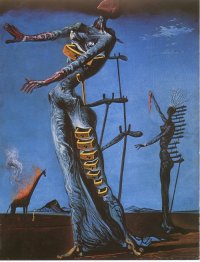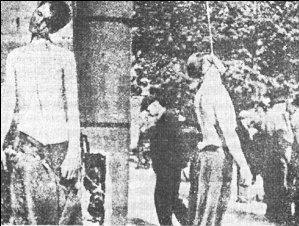 Why is the West encumbered by dhimmi idiots?
Why is the West encumbered by dhimmi idiots? What motivates our citizens and our leaders to chant the mantra "Islam means peace?" Why do we make excuses for Muslims when by any reasonable standard we would be at war with the whole lot of them to the point of utter destruction of one or the other side? It's not because we hate war, are good guys, too advanced, or that Islam is anything other than exactly what we know it is. So why?
It's because of how we decide to interpret our world. It's our collective intellectual attitude that makes our world and us within it act as we do. We might change our collective mind about things as we see them today.
If you are primarily a mental creature existing inside a meat puppet, then you are some kind of mental creature rather than a mental creature. You might be a mental creature that thinks in terms of rationality and reason, looking at the world as a physical space in time, knowable to you as a physical creature through your senses and appeals to reason. You might construct your version of reality according to the rules of reason, examining the world you experience and filtering out that which is not reasonable or logical but that is still attuned to intuitive realities you might not have reason to discard even if you don't have evidence as yet to make logical or rational sense of them. Or you might be an irrational creature, one who relies for your understanding of reality based on what you hear from your local imam who describes reality according to the Qur'an and ahadith and Sira, according to the sunna as interpreted by the imam and your own knowledge. Depending on which approach to knowing what is true about the reality of existence you choose to live in you will be one kind of mental creature or something altogether different. You can be rational or you can be, for example, Muslim. Among other possibilities of deciding what is and how we can know it as mental creatures there is the option of neither science nor revelation but of social science. That choice too will make you some kind of creature not like others.
 If you are a mental creature, knowing reality and existence through your mind rather than strictly through you senses like my cat, for example, living beyond a purely intuitive and sensory experience of life, you can choose also to learn the ways of reality according to reason, revelation, faith, or ideology. You can choose all of those approaches all at once, but one must be dominant, must be the ruling motif of your mental life. If one is Muslim then one lives ones mental life according to the idea that reality is the work of Allah. All that can be known of the work of Allah is what is revealed rather than that which can be reasoned. In Islam, Allah is unbound by logic or even the law of non-contradiction. From that first principle of complete incoherence one is not able to be a different kind of mental creature. One cannot ever be a rational Muslim. That gateway to a different way of knowing reality, the gate of ijtihad, is forever closed and barred.
If you are a mental creature, knowing reality and existence through your mind rather than strictly through you senses like my cat, for example, living beyond a purely intuitive and sensory experience of life, you can choose also to learn the ways of reality according to reason, revelation, faith, or ideology. You can choose all of those approaches all at once, but one must be dominant, must be the ruling motif of your mental life. If one is Muslim then one lives ones mental life according to the idea that reality is the work of Allah. All that can be known of the work of Allah is what is revealed rather than that which can be reasoned. In Islam, Allah is unbound by logic or even the law of non-contradiction. From that first principle of complete incoherence one is not able to be a different kind of mental creature. One cannot ever be a rational Muslim. That gateway to a different way of knowing reality, the gate of ijtihad, is forever closed and barred.
If we, as mental creatures, are what we know, then we are according to how we can know. No Muslim can ever adapt to Modernity. Each and all are total write-offs. If a person is mental, then his mind is not just what his memories and thoughts are but how he knows and continues to know reality. If one were to be irrational today, believing in the omniscience of Allah in the universe, and then tomorrow believing in the primacy of the laws of physics, then one would no longer be Muslim. And what would the Muslim apostate's life be if all that preceded his apostasy were known henceforth as invalid? It's a question most Muslim will never ask, and rightly so, given that a man is seldom likely to destroy his mental world lightly, to commit mental suicide, as it were, not even for the chance of a resurrection into a better life. And worse for the Muslim he seldom if ever has any chance to examine his world-view critically. No, instead he has usually only disincentives, like death for apostasy for a beginning, and permanent exile from his previous life for another.
We have spent much time and effort looking at how we know our universes, how we can know if what we believe is true. We've looked at Steven Dutch on curiosity, and we've looked at Socrates on elenchus and aporia, and we've looked at numerous others on thinking and knowing and understanding. We always come back to the division between Modernity with its rationalist approach to knowing reality and the primitivist approach to knowing reality. We spend great amounts of space here looking at the alternative view of epistemology, the Romantic Irrationalism of philobarbarism, that of Western pseudo-science, the ideological view from anthropology and sociology, for example. It is our unvarnished opinion that social (pseudo)-science is the cause of Left dhimmi fascism and its creation of naive public opinion in support of primitive neo-feudalist fascism. How we as societies view reality, how we decide what is truth and what is falsity, determines how we live our lives, if at all.
Muslims do not examine their own minds. They are the slaves of Allah, and they are so from birth. We might as well forget about them and deal with them as they are and as that dealing requires. It's our own who are the problem: those who decide to look at reality as a social construct that follows mechanical norms determined by outside ingluences, those who would engineer reality to make people conform to it rather than those who would accept reality as it rationally is and make reality conform to Humans. It's an intellectual choice that determines how one will decide reality, and if one comes down on the side of social "science," then one is doomed to be irrational.
Thus, we come to the first part of an essay on Irrationality, the rest of which we'll leave the reader to find and contemplate privately if he or she so chooses. this is an introductionto an essay of some value to those who would pursue this topic further.
***
 The Rise of New Irrationalism and its Incompatibility with Inclusive Democracy
The Rise of New Irrationalism and its Incompatibility with Inclusive Democracy
Takis Fotopoulos
Abstract
The double aim of this article is, first, to examine the causes of the rise of 'new' irrationalism which is contrasted with the classical irrationalism of the 19th century and, second, to show the incompatibility of all sorts of irrationalism (from religion to esoterism, New Age mysticism and so on) with democracy. Finally, the need to develop a new democratic rationalism and democratic ethics, as opposed to the usual attempts to derive an 'objective' ethics from natural or social evolution, is explored.
1. Old and new irrationalism
Rational discourse versus irrational beliefs
The irrationalism, which has flourished both in the North and the South in the last quarter of this century or so, has taken various forms ranging from the revival, in some cases, of the old religions (Christianity, Islam etc) up to the expansion of various irrational trends (mysticism, spritualism, astrology, esoterism, neopaganism, "New Age" etc) which, especially in the West, threaten old religions. We may generally define an irrational belief system as a system whose core beliefs are not derived by rational methods (i.e. reason and/or an appeal to 'facts') but by intuition, instinct, feeling, mystical experience, revelation, will etc. As such, these beliefs are therefore outside any rational discourse. This is particularly true for all religions which have always been characterised by the existence of a set of irrational core truths (God, immortal soul, karma and so on) which are usually inscribed in a sacred text like the Gospel, Koran, Veda etc. In this sense, the world of core truths that characterize all religious systems is and has always been not an open system but a world of closure.
Still, the fact that irrational belief systems usually resort to irrational methods to derive their core 'truths' does not mean that they never use rational methods. Even religious systems sometimes use reason in deriving their truths, albeit within strictly defined limits. These limits are laid down by faith in some core irrational truths. In other words, reason is used by religious systems mainly to justify non-core or peripheral beliefs. Thomas Aquinas, for example, was a rationalist in the sense of believing that the larger part of revealed truth was intelligible to and demonstrable by reason. Still, he also maintained that a number of dogmas which were impenetrable to reason must be accepted on faith alone. Similarly, orthodox Hindus not only give full authority to the Veda but they also hold that human reason errs whenever, on the grounds of perceptual experience, it takes issue with the sacred writings.
In the light of this, It is not therefore surprising that the Pope in his last encyclical,[1] where he considered the relationship of truth, faith and reason, came out in favour of reason (presumably, to attack the irrationalism of New Age which threatens his own and any other established church)! However, his attempt to reconcile faith and reason, which were at odds since the Enlightenment, is clearly formulated within the problematique of Thomas Aquinas.[2] Thus, although the Pope encourages all philosophers , both Christian and non-Christian, "to trust in the power of human reason" he goes on to declare that we must not 'abandon the passion for ultimate truth' since anything which is true , cannot be threatening to faith, because God is truth. As he puts is: "Faith and reason are like two wings on which the human spirit rises to the contemplation of truth." Faith, for the Pope, stirred reason to reach out and attain what was "beautiful, good and true" and in this way became the advocate of reason.
Of course, the conception of reason to which the Pope refers to has little relation to the Enlightenment's conception, which was identified with the power by which man understands the universe and improves his/her own condition. In fact, one might argue that the three main Enlightenment pillars were: dedication to reason, the belief in Progress and the search for freedom in political and social institutions. But, here, we have to make an important distinction between the 'old' and 'new' 'irrationalism' something that will bring us back to the "Age of Reason", i.e. the Enlightenment and the development of rationalism. This distinction becomes necessary by the fact that the causes of the rise of modern irrationalism, as we shall see in the next section, are specific to our own era and as such differ considerably from the historical causes which have led to the rise of classical irrationalism, which flourished in the nineteenth and early twentieth century, as a reaction to classical rationalism.
Rationalism was the philosophical view that regarded reason as the chief source and test of knowledge. In this sense, rationalism has intrinsically been the rival of belief systems claiming esoteric knowledge, whether from mystical experience, revelation, or intuition. For the same reason, rationalism has always been opposed to various irrationalisms that tended to stress the biological, the emotional or volitional, the unconscious, or the existential, at the expense of the rational. In fact, it was in the context of fighting religious irrationalism, which was rampant in Christian West, that the Enlightenment thinkers embarked on the project of establishing a science of history and society, comprising hypotheses and laws of an explanatory power analogous to that attained by theories in the physical sciences. People like Condillac and Condorcet in the 18th century and Henri de Saint-Simon, Auguste Comte and John Stuart Mill, and Henry Thomas Buckle in the 19th century believed that it was feasible to apply scientific procedures to the study of human society. It was in the same context that modern social science was born, either of the 'orthodox' type, which takes the status quo for granted, or of the radical type, which aims at a new society (scientific socialism).
The reaction to the rationalism which characterized the Enlightenment came in the form of the 'old' irrationalism, which developed in 19th century Europe. Still, the objective of this 'old' irrationalism was not to go back to religious absurdity and truth by revelation. Its declared objective was to enrich man's apprehension of life by expanding it beyond the rational to its fuller dimensions. Irrationalism's roots were either in metaphysics or in an awareness of the uniqueness of human experience. Its emphasis was on the dimensions of instinct, feeling, and will as over and against reason.
Manifestations of the irrationalist movement could be seen in various areas:
In ontology, where irrationalism implied that the world is devoid of rational structure (as rationalists argued), meaning and purpose (as religions, particularly Christianity, maintained). In epistemology, where it meant that reason is inherently defective and incapable of knowing the universe without subjective distortion;
In History, where it implied that there is much in the life of the spirit and in human history that could not be dealt with by the rational methods of science;
In ethics, where it signified the futility of the attempt to develop any objective standards;
In anthropology, where it implied a view of human nature as predominantly irrational and;
In art and literature, where romanticism (which emphasized the individual, the subjective, the irrational, the imaginative, the personal, the spontaneous, the emotional, the visionary, and the transcendental) was a reaction against the Enlightenment and against 18th-century rationalism and physical materialism in general. Similarly, the surrealist movement this century represented a reaction against what its members saw as the destruction wrought by the "rationalism" that had guided European culture and politics in the past and had culminated in the horrors of World War I. Surrealism was seen by the founders of the movement as a means of reuniting conscious and unconscious realms of experience so that the world of dream and fantasy would be joined to the everyday rational world in "an absolute reality, a surreality.
As it is obvious from the above list, similar views are expressed on many of the above topics by contemporary irrationalists. The difference is that today it is not just irrationalists of various sorts who, using a variety of irrational methods, adopt such views. Today, rational methods can be employed, and have been successfully employed, to show that:
the world is indeed devoid of any meaning apart from the one that we assign to it;
there can be no science of History, or of society and the economy because there is indeed subjective distortion in interpreting social phenomena;
there is no linear or dialectical Progress in History;
it is impossible to derive any 'objective' ethics from natural or social evolution;
there is no fixed human nature, rational or irrational;
it is possible to interpret in a rational way the unconscious and its interaction to the conscious realm of experience.
In fact, the very existence of a rational discourse, which can be used to justify the above conclusions today, is what makes the 'new' irrationalists even more irrational than the old ones. If, a century ago, it may have been forgivable to examine the limitations of science with the use of non-rational methods it is obviously nonsensical to do the same today, when the rational discourse on the limitations of science (particularly social science) and the rational critique of several core Enlightenment ideas, like that of Progress, is fully developed.
Today, with hindsight, we can pronounce that the project of creating a 'science' of society, economy and history, which would command a comparable degree of intersubjectivity to that in natural sciences, was doomed to failure. But, one does not have to use irrational methods anymore to criticize Progress, science and technology. The fact, for instance, that there are no 'laws of history' does not have to be shown by viewing History intuitively as an irrational process of organic growth and decay, as Oswald Spengler[3], an old irrationalist, tried to do. Without having to resort to the conformism of post-modernists, radical thinkers like Castoriadis, far from an irrationalist himself, have also shown the impossibility of scientifying or 'rationalising' History (History is essentially creation-creation and destruction.)[4]
Similarly, as I attempted to show elsewhere,[5] most of what passes today as social science is in fact ideology, i.e. a set of rational interpretations (namely, interpretations derived through reason and/or an appeal to 'facts') of society's or economy's structure and dynamics from a particular world view's point. As such, this study always reflects particular interests. At a high level of abstraction, social 'science' reflects either the interests of the ruling elites (orthodox social 'science'), in which case it takes the present socio-economic system (market economy/liberal 'democracy') for granted, or those of the rest of society (radical social 'science'), in which case it does not. As I argued there, the very object of study of social 'sciences' (society), versus that of natural sciences (nature), precludes the possibility of developing a science of social phenomena which would enjoy a comparable degree of general acceptability to that of the study of natural phenomena. The reason is that it is much more difficult, if not impossible, to separate subject from object of study in the former case compared with the latter. We live in a divided society and therefore the social scientist's worldview plays a crucial role in the assumptions s/he makes and the conclusions s/he derives. So, it is not just the lack of the possibility of experiment, which differentiates the two types of studies, as it is usually asserted. The crucial difference between social and natural sciences arises from the fact that whereas the tenets of natural sciences are generally accepted by natural scientists at a given time period, the tenets of social sciences are not, since there can never be a single paradigm about social reality, as long as society is divided. In fact, the very choice of paradigm to be adopted by a social scientist depends on a preconception: whether the present socio-economic system is taken for granted or not.
Rational ideologies and irrational belief systems
Still, notwithstanding Bertrand Russell,[6] I think it is wrong to compare a rational ideology like Marxism, with an irrational belief system like Christianity, Buddism, or Islam. In other words, I would not agree with the argument put forward by some writers[7], who, following Russell, argue that modern Western ideologies like Marxism and Liberalism were just variations of the Judeo-Christian conception, in the sense that they all were dogmas based on an unquestionable truth, irrespectively of whether this truth is transcendental, (as in the case of religion), or rational, (which can be 'proved' as 'objective' by the use of some rational method, eg. positivism or dialectics).
I think that although there are superficial similarities between an irrational belief system like Christianity and a rational ideology like Marxism (church/party, priests/avant guard etc), still, the crucial differences between them cannot be ignored. As I mentioned above, a fundamental characteristic of every irrational belief system is the existence of a set of core beliefs which are derived by non-rational methods (intuition, instinct, feeling etc). The fact that in many irrational belief systems there are also peripheral beliefs which may have been derived through the use of rational methods does not change their fundamentally irrational character. An irrational belief system is therefore irrefutable, since it is based on core beliefs, which are not expressed as rational hypotheses about reality, but as dogmas, intuitions etc, which are outside rational discourse.
On the other hand, a rational ideology is refutable by an appeal to reason and/or the 'facts' because not only its peripheral ideas, but also its core ones, have been derived through a rational process. By "refutability" I do not of course mean strict "falsifiability" in the Popperian sense.[8] As I attempted to show elsewhere[9], it is not possible to derive any objective scientific criteria for the verification/falsification of the Marxist hypotheses as scientific hypotheses. But, the same applies to orthodox economic theory and to social 'sciences' in general. So, when I talk about the refutability of a rational ideology vs. the irrefutability of irrational belief systems what I mean is that the former contains refutable hypotheses, (i.e. hypotheses which although cannot be 'proven' or 'disproven' by 'facts' still are amenable to rational discussion, namely, to discussion which can be informed by reason and evidence) whereas the latter contains a core of irrefutable hypotheses. The Marxist hypothesis, for instance, that as capitalism spreads all over the world it "creates a world after its own image"[10] is refutable and can be discussed rationally; in fact, it has been successfully challenged by radical development theory in the 1960s and the 1970s. On the other hand, there is no way to discuss rationally, for instance, the Christian belief in the Second Coming, or the Buddhist belief in reincarnation, the deep ecology's intuition on biocentric equality, or the New Age's belief in the 'inner dynamic' since all these beliefs are not refutable hypotheses derived through rational methods but irrational beliefs derived through intuition etc.
Of course, the refutation of some of the core beliefs of a rational ideology like Marxism does not constitute a refutation of the entire ideology and it is more than likely that it will not 'convert' the fanatic. Still, it may persuade the more sophisticated supporters of the ideology to start questioning some at least of their cheriched beliefs. In fact, core Marxist hypotheses (like some of the Marxist economic 'laws') have been tested by an appeal to reason/facts both by Marxists and non-Marxists and found wanting and this has significantly contributed to the decline of Marxism as an ideology (although some basic Marxist insights are still valid), much before the collapse of actual existing socialism. But, this kind of refutation is absolutely impossible with respect to irrational belief systems. First, because many of these beliefs cannot be refuted by any kind of rational method since they usually consist of non-refutable hypotheses (metaphysical beliefs, intuitions etc). Second, because even for those of such beliefs for which an appeal to reason and/or 'facts' is possible (e.g. various superstitions which we may rationally explain using today's knowledge), no such an appeal will ever be acceptable by believers, unless they are in the process of abandoning their faith. This is why very few, if any, core religious truths have collapsed (I am not talking about 'heresies'), despite the huge growth of knowledge, particularly in the last two centuries.
In other words, what matters in distinguishing between rational ideologies and irrational belief systems is the source of 'truth'. If the source of truth of the core ideas is reason/'facts', despite the fact that these ideas cannot be shown to be ?objective? (in the sense of general acceptability as in natural sciences), then we are talking about a rational (and refutable) ideology. On the other hand, if the source of truth of the core ideas is an irrational method (revelation, intuition etc) then we are talking about an irrational (and irrefutable) belief system. Of course, what is considered as a rational process of thought, varies in time and space. As Castoriadis[11] puts it "what is different in another society and another epoch is its very 'rationality', for it is 'caught' each time in another imaginary world." Still, this does not negate the criterion I used to distinguish between rational and irrational ideas: that in a rational ideology both its core and peripheral ideas are derived through a rational method (albeit spatially and historically constrained), whereas in an irrational belief system some at least of its core ideas are derived through a non-rational method.
The practical implication of the above distinction is that an irrational belief system, although perhaps useful for those that need it (for psychological or social reasons, or because they cannot just accept death as the end of existence, the burden of personal responsibility etc), it surely cannot be the basis for any rational interpretation of reality. For a rational interpretation of reality (always, of course, from a particular world-views?point of view) a rational ideology is needed.
One possible objection to the exclusive use of rational methods in understanding reality is that in the world of art, in particular, intuition as well as other non-rational methods have for long been used by artists in deriving their own 'truth' which, when successful, is identified with universal "truth." However, one must point out here that a work of art is of an entirely different nature than an ideology or an irrational belief system. As even Ernst Fisher, a Marxist, had to recognise in his classic work The Necessity of Art:
True as it is that the essential function of art for a class destined to change the world is not that of making magic but of enlightening and stimulating action, it is equally true that a magical residue in art cannot be entirely eliminated, for without that minute residue of its original nature, art ceases to be art. Art is necessary in order that man should be able to recognise and change the world. But art is also necessary by virtue of the magic inherent in it.[12]
In other words, given the dual function of art to enlighten but also to make magic, it is obvious that, leaving aside the issue of the artist's objectives, art is a completely inappropriate tool for a rational interpretation of reality. The magic element in art, which draws on the artist's non-rational inspiration, may be compatible with an irrational belief system, but not with a rational ideology. Therefore, for the same reasons for which an irrational belief system is completely inappropriate to give a rational interpretation of reality, art, because of its magical dimension, is correspondingly inappropriate for this purpose, although, of course, nobody could dispute its power to offer important insights about reality.
***
We in the modern West have the ability to choose how we will think, and we have the choice of not choosing, as well, as Keirkegaard writes: "Not to decide is to decide." We make choices regardless, and they determine what kind of persons we are. Our choices today determine whetgher we will phsically survive, and whether our children will live freely as we do or if they'll live in slavery as dhimmis under the boot of Islam. It will all depend, this struggle for the future, on which course of reality we collectively decide to take.

 Walker, originally from Tennessee, having lost the love of his life to disease, studied medicine and law at universities in Nashville, Edinburgh, Gottengen, Heidelberg, Paris, and New Orleans. He witnessed the activities of the revolutions of 1848 and the effects of the Paris Commune. He returned to America and practiced law and medicine before finally moving to San Fransisco in 1850 where he found himself amidst the Goldrush 49ers.
Walker, originally from Tennessee, having lost the love of his life to disease, studied medicine and law at universities in Nashville, Edinburgh, Gottengen, Heidelberg, Paris, and New Orleans. He witnessed the activities of the revolutions of 1848 and the effects of the Paris Commune. He returned to America and practiced law and medicine before finally moving to San Fransisco in 1850 where he found himself amidst the Goldrush 49ers. Kingdom of Saudi Arabia, the center of fascist Islam, should be our focus for the private enterprise of modern filibustering, the Dutch word for freebooting. i.e. land piracy. Far from being a racist or fascist agenda, ours is simple human endeavour to expand ones horizons combined with the enlightened project of bringing freedom, liberty, and democracy to the world masses who cannot, for whatever reasons, make it themselves. Those laboring under the illusions of false consciousness, of the idiocies of rural living, of the darkness of fascism, they are not essential in the project of emancipation. Saudi Arabia, its collective native population, as dedicated to the furtherance of Islam and primitivism as they might be, have only a contingent right to existence on their current lands, as Eduord Bernstein points out, which they forfeit in their attempts to prevent progress and human freedom genrally and especially in Arabia itself. The Saudi royals and their supporters and natives of the land have no legitimate right to continue their existence thereon if it means they continue to impede the telos of Humanity, i.e. progress and liberalism.
Kingdom of Saudi Arabia, the center of fascist Islam, should be our focus for the private enterprise of modern filibustering, the Dutch word for freebooting. i.e. land piracy. Far from being a racist or fascist agenda, ours is simple human endeavour to expand ones horizons combined with the enlightened project of bringing freedom, liberty, and democracy to the world masses who cannot, for whatever reasons, make it themselves. Those laboring under the illusions of false consciousness, of the idiocies of rural living, of the darkness of fascism, they are not essential in the project of emancipation. Saudi Arabia, its collective native population, as dedicated to the furtherance of Islam and primitivism as they might be, have only a contingent right to existence on their current lands, as Eduord Bernstein points out, which they forfeit in their attempts to prevent progress and human freedom genrally and especially in Arabia itself. The Saudi royals and their supporters and natives of the land have no legitimate right to continue their existence thereon if it means they continue to impede the telos of Humanity, i.e. progress and liberalism.
















